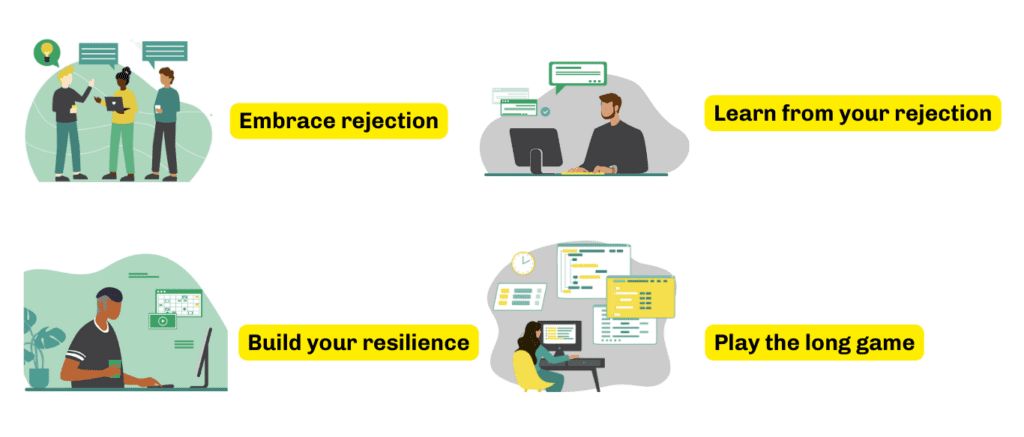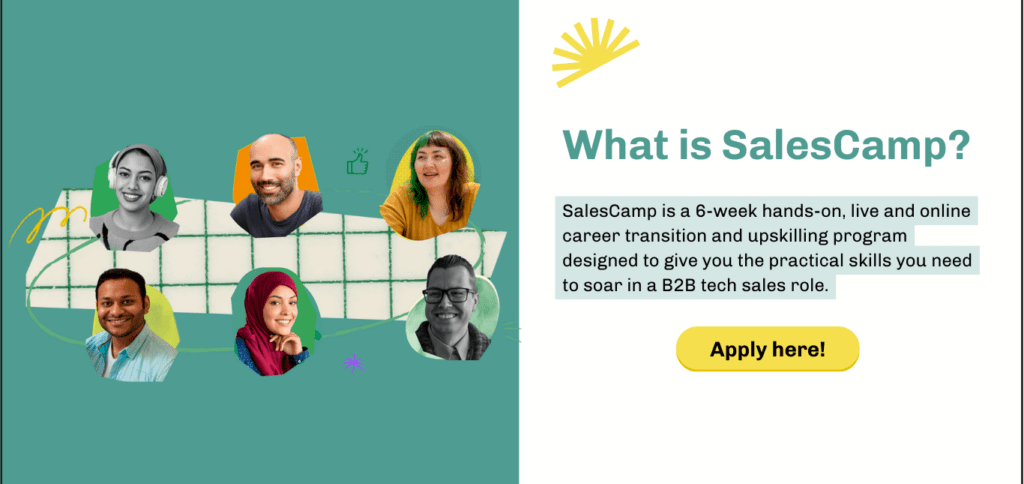Handling rejection is vital
If we lived in a perfect world, you wouldn’t need to read this article. After all, if the world was perfect, you’d never have to deal with rejection as a B2B (business-to-business) sales professional. But as we know, the world is far from perfect, which means we need to learn how to deal with rejection. Beyond learning how to not take rejection personally, at Palette Skills we think that by using the strategies outlined in this article, you’ll be able to start working with rejection as a key part of your professional skills set.
The first thing to acknowledge is that rejection hurts. In fact, there is scientific evidence that the way we feel about rejection is similar to how we experience pain. So it’s no wonder that we do what we can to avoid the pain of rejection. But here’s the thing: that can sometimes mean not picking up the phone to make the next call, or it could mean finding a low-risk career option where you won’t be as exposed to rejection like you are in B2B sales. And that would be a pity, because with little risk, there is little reward.
The fact is that as a B2B sales professional, you’ll face rejection all the time. What matters is how well you handle rejection, how much you learn from it, how resilient you are, and how rejection figures as part of your long-term game plan. So here are four ways to make rejection work for you.

1. Listen to rejection, and acknowledge it.
Has anyone ever told you something you didn’t want to hear? Something that was painful that you took personally? Most of the time when something like that happens, we actually don’t take in what people are saying very well. In fact, it’s been proven that rejection can have a negative impact on cognitive function. That’s a problem for different reasons. First of all, it can mean something as important as not being able to see the difference between objection and rejection. And when our cognitive function shuts down because of pain or rejection, it has an effect on our ability to learn, and can result in poor decision-making.
That’s why it’s so important to be able to listen to rejection, and to learn from it. In fact, you need to be able to lean into rejection and discover what your sales prospect is really trying to tell you. It sounds difficult, and it can be at first. But to make rejection work for you it’s vital to actively listen. Make a point of acknowledging rejection when it comes—both to yourself, and to your prospect. This not only helps you shift the focus of the conversation away from your own feelings of rejection, it lets you learn more about a prospect’s pain points. You’ll also be placing your prospect’s experience front and centre in a way that builds your credibility.
2. Seek out rejection, and learn from it.
It’s easy to think that when a prospect rejects a product or service we are offering that we’ve made a mistake. But that’s not always true. You will always face people and organizations who, for a variety of reasons, are not in a position to say yes. All of this is critical information for you and your product or service, so you need to seek out as much rejection as you can, and start learning from it.
Start thinking about rejection as information. The more information a business has about the market, the more likely it is to succeed. Rejection can help you identify opportunities to improve not only how you sell, but who you sell to. So the faster you are able to jump in and find rejection, the more quickly you’ll be able to pivot and move forward. In fact, there are some expert salespeople out there who argue that you should actually set goals for the number of rejections you get in a week.
And let’s say that you and your organization are making a mistake somewhere in how you market and offer your product or service. It’s often said that we learn from our mistakes. But we all know people and businesses that don’t. You can’t afford to be that person or that business, so you can’t afford to back away from rejection.
3. Build your resilience
It turns out that in B2B sales, the most important skills you have aren’t technical ones like building software or programming code. Instead, your soft skills are the key to your success in the industry. These skills include things like active listening, continuous learning, empathy, and more.
There’s another critical soft skill that you need to develop, and that’s resilience. So what is it, and why does it matter? When we talk about resilience as a soft skill, we mean having the ability to adapt in a positive way when faced with a challenge, or with rejection. Clearly, this kind of resilience is vital when it comes to overcoming the pain of rejection in sales. When you learn to practice and build your resilience, you’ll be better able to maintain your self-confidence, treat rejection as a learning opportunity, and create a strong and sustainable sense of motivation to succeed.
Remember what we said about how the experience of rejection happens in the same part of the brain where we deal with physical pain? If that’s the case, then by building resilience, we can train ourselves to take on rejection and move past it. And when that happens, we can take advantage of rejection, and use it to build a culture of “positive failure” that will help you and your organization grow and succeed.
Here’s the other thing: People who are emotionally and mentally resilient tend to be the kind of people who understand that rejection is an important source of feedback that lets them know they are fully engaged with their life—and their career.
4. Play the long game
Finally, it’s critical to get beyond the dream of the quick sale. We’ve talked about the long sales cycle before, and it’s especially true in complex B2B sales. Unlike B2C (business-to-customer) transactions, B2B sales often involve multiple decision-makers, lengthy approval processes, and intricate procurement procedures. You can bet that the larger the sale amount, the longer it will take to make the sale.
It also means that you are more likely to face objections and rejections. You need to be ready for that, because you need to be looking forward. If you’ve really listened to a prospect when they said no, and listened actively and respectively, you will have established a level of trust and credibility with that person and the organization. The beauty of rejection is that it is one step on the road to building the thing that is most valuable in sales, and that is a long term relationship.
Eventually, that prospect might need what you are offering, and if you’ve made a connection with them, they’ll remember you. And don’t forget that the prospect who said no but got off the phone with you feeling respected and listened to is part of a network, and will likely recommend you when the solution you are offering comes up again. It’s another reason why playing the long game is critical for growth.
Upskill to grow
If you’ve been hungry to develop these and other critical skills for B2B success, consider upskilling with SalesCamp from Palette Skills. It’s a 6-week hands-on, live and online career transition and upskilling program designed to give you the practical skills you need to soar in a B2B tech sales role. More than 500 people have completed the SalesCamp program, and 90% of them recommend that you sign up, too. 35% of our grads receive a promotion in their new career within 18 months of starting out. Don’t wait! Find out more about SalesCamp here!
This blog is sponsored by:









